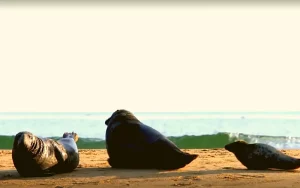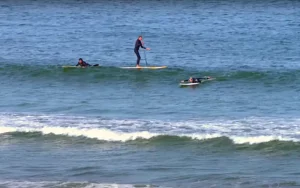Swimming in Cape Cod can be safe with essential precautions. Shark attacks are rare while other beach-related incidents are more common.
To stay safe, avoid seals, swim close to shore, stay in groups, and understand beach flag warnings. Choose clear water for better visibility, minimizing risks. Refrain from wearing jewelry to avoid shark confusion.
Some of the safest beaches in Cape Cod are Marconi, Coast Guard, Paine’s Creek, Corporation, Seagull, and Ridgevale Beach.
There are more things you need to learn regarding your concern: Is it safe to swim in Cape Cod? Hang tight with the article.
Is It Safe to Swim in Cape Cod?
Swimming in Cape Cod can be safe when you take the necessary precautions. Although concerns about sharks are prevalent, the chances of a shark attack are relatively low.
Since 2016, there has been an increased number of reports of shark activity. However, the likelihood of drowning or experiencing other beach-related incidents is considerably higher than being attacked by a shark.
Even so, drowning or encountering other beach hazards (1 in 2 million) is significantly more likely than a shark attack (1 in 11.5 million).
Things to Consider While Swimming in Cape Cod
Swimming in Cape Cod offers enjoyment, but safety must be a priority. There are many things you need to consider while swimming in Cape Cod. Consider the following when swimming:
Shark Safety
Great white sharks inhabit Cape Cod waters just like alligators in Fort Lauderdale.
To avoid encounters, stay away from seals (their primary prey), swim close to shore, and stay in groups. Avoid solo swimming at dawn or dusk, minimize splashing, and don’t wear shiny jewelry. Follow lifeguard instructions and heed beach flag warnings.
Also, visitors should avoid swimming alone in the ocean at dawn or dusk and wear jewelry that is not shiny. Be familiar with the beach flag warning system and follow the instructions of lifeguards.
Beach Safety
Be alert to rip tides, shore breaks, and strong undercurrents. Never turn your back to the ocean and avoid swimming alone.
Beach-related fatalities are more common than shark attacks. Swimming may be one of the things to do in Cape Cod, but be sure to check with the lifeguards.
Water Visibility
Opt for clear water as it aids visibility for both you and the sharks. Clear water allows swimmers to spot potential dangers, such as rip currents, debris, or marine life, well in advance.
Also, transparent water enables both swimmers and marine life, including sharks, to see each other clearly.
How To Avoid Shark in Cape Cod?
To minimize the already astronomical odds of a shark encounter in Cape Cod:
Avoid Seals
Cape Cod’s shark population thrives due to abundant seals. Don’t swim near them; sharks might mistake you for a seal. Plus, disturbing seals is against the law in Massachusetts.
Stay Close to Shore
Swimming closer to the shore not only makes practical sense but also reduces the risk of encountering sharks. It’s safer, and you’re less likely to encounter rip tides or hypothermia.
Don’t Taunt Sharks
Respect their space. While sharks may not naturally view humans as prey, provocation can lead to unexpected attacks, and you’d have no one to blame but yourself.
Avoid Murky Water
Opaque water hinders your ability to see approaching danger and confuses sharks. Murky water also poses additional safety concerns more likely to affect you.
Time and Company
Sharks tend to hunt in low light and cooler temperatures, so be cautious in the morning and evening. Swimming with others increases safety and support in case of trouble.
Avoid Jewelry
Sharks have been known to mistake shiny jewelry for fish scales. Therefore, it is advisable to refrain from wearing jewelry while on the beach to avoid attracting these marine predators.
Safety Measures Against Sharks on Cape Cod Beaches
Cape Cod collaborates with the Regional Shark Working Group to enhance knowledge, awareness, and safety concerning shark presence in local waters. This partnership has led to the implementation of various safety measures.
- Informative beach signage, including “Swim at Your Own Risk” when lifeguards are absent, and shark warning signs.
- A Flag Warning System employs red flags to indicate unsafe water conditions and purple flags to signal potential shark risks.
- Distribution of informative brochures and a shark awareness video.
- The introduction of the Sharktivity app, which provides real-time tracking of shark locations in Cape Cod waters.
What Are the Safest Beaches to Swim in Cape Cod?
Not necessarily every beach in Cape Cod is full of sharks. Cape Cod boasts several safe swimming beaches. Some of them are also examples of the best Cape Cod Beaches for vacationing. Here are some of the most secure options:
Marconi Beach (Wellfleet)
Widely recognized for its spacious sandy shoreline and clear waters, it’s a popular destination for swimming, sunbathing, and surfing.
Coast Guard Beach (Eastham)
Renowned for its pristine sands and serene waters, it’s an excellent location for swimming and sun-soaked relaxation.
Paine’s Creek (Brewster)
Known for its warm and placid waters, it’s an ideal spot for swimming, kayaking, and paddleboarding.
Corporation Beach (Dennis)
Featuring gentle surf and low tides, it’s a top choice for swimming and sunbathing.
Seagull Beach (West Yarmouth)
A family-friendly destination with tranquil waters, perfect for swimming and sandcastle building.
Ridgevale Beach (Chatham)
Offers warm and calm waters, making it an excellent spot for swimming, kayaking, and paddleboarding.
FAQs
Do Sharks Swim In Shallow Water?
Yes, Sharks can indeed swim in shallow water, and most swimmer-targeted shark attacks happen in waters around 6 to 10 feet deep. Sharks may mistake swimmers for prey due to their bright, flashy colors.
Do Shark Attacks Happen Close To Shore?
Yes, shark attacks can happen close to shore, with most swimmers targeted in shallow waters around 6 to 10 feet deep. Sharks might mistake swimmers for prey, especially if they wear bright, flashy colors. Visitors to Cape Cod beaches should be cautious.
Is Cape Cod’s Water Clean?
Pollution from septic systems, stormwater, and fertilizers is deteriorating Cape Cod’s water quality. The Association to Preserve Cape Cod (APCC) reports a decline in bays and estuaries.
Conclusion
Now, you know the answer to your concern whether it is safe to swim in Cape Cod.
Swimming in Cape Cod can be an enjoyable and relatively safe experience if visitors adhere to essential safety precautions.
While concerns about shark encounters exist, the risk is statistically low, with more common dangers such as drowning and beach-related incidents. You must maintain safety guidelines while being there.








